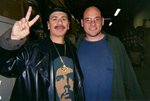 Severna Park
Severna ParkOvercast, 54°
Wind: 4.6 mph, E
 Severna Park
Severna Park


Wanted: World’s largest reggae collection seeks emotionally stable, progressively minded, financially secure home for long-term, committed relationship. Serious inquiries only, please.
Reggae — the Jamaican-born, Rastafarian music with a defiant live-and-love message and a syncopated, lilting beat — has provided anti-oppression anthems for people of developing nations around the globe. And now, the world’s largest reggae archives — painstakingly assembled by collector and curator Roger Steffens over the course of 40 years — is on the lookout for new digs. Steffens’ collection is the subject of a new documentary, “Livicated,” by filmmaker and former Severna Park resident Erik Crown.
The primary subject of Crown’s documentary is Steffens, an avid photographer, author, DJ, voiceover actor and all-around counterculture luminary. The real deal, Steffens spent two weeks on the road with Bob Marley in the early ‘80s, documenting the original “Survival” tour; he co-hosted and produced the KCRW radio show “Reggae Beat;” he’s authored six books and countless articles on the roots-reggae movement. Currently, Steffens’ reggae collection fills six rooms in the basement of his Los Angeles home, which draws regular visits from the likes of Carlos Santana, Ben Harper, Keith Richards, Hollywood royalty, DJs, scholars and seekers who come to pore through the shelves. The archives include 30,000 reggae fliers from all over the world, 2,000 reggae posters (many of them signed by the original artists), 140 cubic feet of alphabetized clippings, and a multitude of books, magazines, autographed records, old 45s, liner notes and letters, as well as the rare Bob Marley “Bedroom Tapes,” on which the larger-than-life prophet of reggae can be heard doodling around on an acoustic guitar in the privacy of his boudoir.
Now in his 70s, Steffens is anxious to see his magnum opus securely installed in a permanent home. It’s the only one of its kind: a similar collection existed for years in Jamaica but was found looted in 2008; tragically, many classic cuts went missing, lost forever. No longer a young man, Steffens feels he’s in a race against time; he seeks a buyer who will agree to three specific caveats: The collection must stay intact, it must be made available to the general public and the artists must be fairly compensated if the collection generates a profit.
Crown has created an intimate portrait of Steffens, the archives and the reggae community in his documentary film, “Livicated,” scheduled to hit festivals this summer. The son of a CBS news editor, Crown grew up in Severna Park. He was a bit of a lone wolf when he attended Severna Park High School. “I had a John Hughes upbringing, always on the outcast side,” Crown noted.
He found early on that editing footage provided a much-needed outlet for self-expression. While still in high school, he made a protest film of Vietnam vets speaking out against the Persian Gulf War. Later, a chance encounter at a film festival with Ziggy Marley’s guitar player, Earl “Chinna” Smith, set Crown on his reggae-centric trajectory. Crown connected with the older musician over politics and, at Smith’s suggestion, began frequenting a Rasta camp in Baltimore, where he immersed himself in the mystical and ethical roots of Rastafarianism. A highly respected Rasta “elder,” Ras Pidow, became a kind of mentor to Crown; as Crown delved deeper into reggae music and culture, he picked up the buzz about a man known as the “Willy Wonka of reggae” — Roger Steffens. On a gut instinct, Crown purchased a one-way Greyhound bus ticket from Baltimore to Los Angeles and set off in search of Steffens.
“My quest was to become more ‘head-ucated’ on Rasta and music as a [political] weapon,” said Crown. “I was a hippie and very politically active protestor and wanted to make films that were civil rights oriented.”
In Los Angeles, Crown landed a survival job at the L.A. Adventurer Hotel (“a pretty wild place,” as he referred to it) in a rough section of Inglewood, living at the hotel and working as the night clerk. After a few months, Crown started to doubt himself.
“I had been in L.A. close to a year and was getting nowhere,” he said. “I was starting to lose hope.” It was around this time that the owner of the hotel went on vacation, leaving Crown in charge. Amazingly, the first person to walk through the door that day was none other than Zola Burse, the promoter for the 1999 “Spirit of Unity” tour, which featured such bands as Culture, Maxi Priest and Steel Pulse. The tour booked the entire hotel, and suddenly Crown found himself playing host to some of the top reggae musicians in the world.
He took it as a sign.
Through his “Spirit of Unity” contacts, he was able to meet Steffens, as well as producer Paul Madelenat; the collaboration has resulted in a series of exclusive filmed interviews with Steffens, Ben Harper, Neville Garrick and the upcoming “Livicated” documentary, which draws extensively on archival footage of Bob Marley, Jimmy Cliff, Miriam Makemba and Peter Tosh, among others.
How has the project influenced Crown personally? “It’s impacted me in a great way,” Crown acknowledged. “I see clearer; I’ve grown; I’m a better person after meeting this culture — their warmth and generosity, they’ve been so welcoming.”
For more information about Crown’s “Livicated” documentary and Roger Steffens’ Bob Marley archives, go to www.livicated.com.
Comments
No comments on this item Please log in to comment by clicking here